Recommended for krimieologists.
This title is the first in a continuing series featuring Chief Inspector David Brock and Sergeant Kathy Kolla. It is assured and has a light touch though the subject is murder.
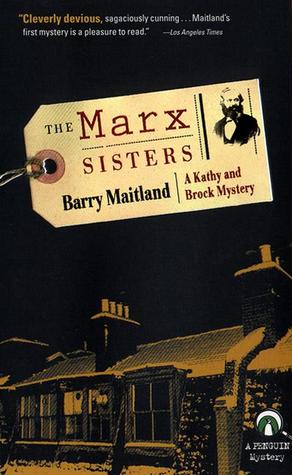
The sisters are indeed distant relatives of Eleanor Marx (wife of Karl) and that figures in the plot in several ways.
There are many blue herrings, as Hercule Poirot says when the English idiom fails him, from a son eager for an inheritance, a developer who wants to build a giant building, an angry neighbor. Perhaps the dominant character is a place, Jerusalem Lane where the sisters live. It is marvelously invoked, though my London A to Z does not list it, more’s the pity.
The police make mistakes and pursue some of those blue herrings. Even the inscrutable Brock sometimes blunders. Fallibility appeals to me.
There is a delicious portrait of a solipsistic and unscrupulous scholar who reminded me of some I have known.
This first volume in the series is mercifully free of Kolla’s endless capacity for self-pity that I find distasteful in the latter volumes, though the seeds are there. Too often Kolla’s main interest is Kolla. No doubt some readers find her incessant self-doubts and uncertainties attractive but they are too narcissistic for this reader.
For more information go to:
http://www.barrymaitland.com/index.html
Personal note. Like many others, when I first used the Reading Room at the British Museum I sat in the seat Karl Marx habitually used.
James Benn, Death’s Door (2012)
I enjoyed the portrayal and factions, bureaucratic turf wars, national animosities, divisions within divisions within the micro-state of Vatican City, only made sovereign by the Lateran Treaty with Italy (Mussolini) in 1929. The Vatican police force is divided into three, the neutral, the fascist, and the anti-fascist. The Swiss Guards have real uniforms and weapons. The Vatican police and Vatican’s Swiss Guards are two separate groups and not friends. Most of the Swiss are Sweizcher Deutsch who look down on the Italians in the police. The police are called gendarmes for some reason. Our hero interacts with the gendarmes inside the Vatican, while the Swiss Guards patrol the line of demarcation.
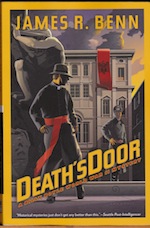
The book offers an explanation of Pope Pius XII’s quiescence in 1943 anyway. By then there were 5000 Jews, downed Allied airmen, anti-fascist Italians, salted away in Vatican City and in Vatican properties (part the Vatican’s sovereign soil by the Treaty) elsewhere in Rome. The Pope’s vast summer palace in the hills outside Rome was home to another 15,000 refugees. Silence might be the best way to avoid interesting the Germans in them.
Moreover, with Mussolini reduced to a puppet up North and only the most extreme Italian fascist left in Rome along with the occupying Germans, there was the danger that the Germans might decide to take the Pope north for his own safety on the pretext of Allied bombing, exposing not only the refugees in the Vatican but also its many treasures and destroying its studied neutrality. A low profile might be best so as not to give a pretext. Hmm, but if the Germans had a mind to do that, a pretext could be conjured as it was many times before.
Also liked the tension on the white painted line of demarcation in the square in front of the Vatican that still marks off the sovereignty of the Vatican, but in these days it was patrolled by the Swiss Guards on one side and the German army on the other. I liked the geography of the buildings and gardens in the Vatican, including the Vatican radio.
The evils of the Gestapo and SS were old news. Our intrepid hero was cardboard as were most of the other characters. Though there were a variety of characters and they did differ, I admit. I liked the way some of them reacted to being trapped in the gilded cage of the Vatican when the war cut them off, like the American diplomat who disappeared into the brandy bottle.
Some interesting characters appeared but not enough was made of the artful scrounger, the butler John May, Detective Cipriano of the Vatican police, or Abe the pilot lock-picker.
Not sure what to make of the good German, Remke and his team. Doomed, of course. The Italian OVRA sadist was a drooling stereotype as was the evil Croatian bishop.
The villain was hard to credit.
Billy tried too hard to be a reverse snob. Most of his wisecracks were tired sixty years ago. As is usually the case his backstory was simply a distracting filler.
Many of the events take place in the German College in the Vatican but no ever connects this with the Germans outside and there seem to be no Germans in the Vatican. No German cardinal or archbishops or bishop.
Nothing about the Italian day workers who come to work every day.
The prose is workmanlike.
The Billy Boyle books each have different setting so that is goodbye to the Vatican. But I will try searching for Vatican krimies.
Carl Sandburg, Abraham Lincoln: The Prairie Years and The War Years (1925).
There are scores of Lincoln biographies. I have long been dimly aware of a multi-volume biography of Abraham Lincoln by that poet of the Great Plains, Carl Sandburg, but eight volumes was much more than I wanted. In the oral version from Audible it runs to 44 hours. However I did notice that there was a one volume abridgement. That then was the obvious choice. A biography of the most famous son of Illinois by the most renown poet of Illinois.
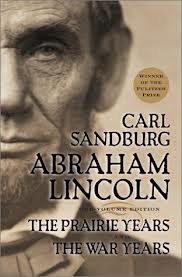
All the well known stories are there and I shall not retail them.
New to me
Length and variety of his militia service
Travel down the river to New Orleans
Early and unequivocal objection to slavery on moral grounds in public statement occasioned by pursuit of runaways slaves into illinois
His gradual drift into politics because government could build bridges, dig drains, etc that this small community could never do. Local improvements, they were called at the time.
Saw Zachery Taylor and William Henry Harrison who both later became president.
By 1837 Lincoln opposed slavery on moral grounds, but accepted it in the South because of the Constitution.
As a mediator he learned from his father’s example of dealing with eight children of a blended family in a one-room cabin. Defuse the situation and illustrate with humor
He spoke up on local improvements and because he had learned to read and write, others who could not do either turned to him to prepare petitions.
He became a state representative as Whig, worked hard at committees, reports, speeches
He saw and served in some run away slave case in Illinois.
He was a one-term congressman as a Whig, campaigned for other Whigs in Ohio, Pennsylvania, Kentucky.
Lincoln voted several times for the Wilmot Provision to prevent slavery in new territories and states.
In his notebooks Lincoln puzzled over the morality, constitutionality, legality of slavery in whole and in part for years.
He concluded it was immoral since 1837, only indirectly constitutional in the States that had it a when the constitution was agreed, but fugitive slave act was legal, made by congress.
So he wanted to stop spread of slavery to other or new states, stop slave trade bringing in new slaves, but not for ending it since it was legal and partly constitutional in South Carolina and its ilk and since there was no way to cope with one million slaves in seven states who would be made free overnight and impossible to work out how to do it gradually, So on practical grounds there was no solution. Abolitionists seemed to have no plan for what to do if slavery were abolished, rather like all the Greens today who scream immediate action without a thought for consequences. He would have preferred to keep the Missouri compromise but it lapsed with the Compromise of 1850 which was a hodgepodge of deals and concessions much too delicately balanced to last.
Anti-immigrant and anti-Catholic Know Nothing Party arose (reminds me of Tea Party!)
Lincoln supported immigrants to vote, to get citizenship quickly and they voted for him.
The number of immigrants at the period is enormous 12,000 a month in Chicago, not all stayed there but went on to Indiana, Iowa, Kansas, Missouri, and Nebraska.
When the Free Soil Party morphed into Republicans at Ripon Wisconsin (an event no longer celebrated on the Republican National Committee website, such is the pernicious influence of the ideologues) Lincoln had no baggage as an old time Whig, he was from the West and fresh and energetic, and he wanted the presidential nomination in 1860.
He seemed to like being at the centre of things in Illinois legislature and got the ambition.
In a four-way race he won the electoral vote on the popular vote in the larger, northern states. The Southern states started seceding from the Union long before he took the oath of office in March 1961.
Lincoln the president was slow, thoughtful, pragmatic, thick-skinned, patient, mindful of his limitations and those of others. Not to be stampeded by cabinet, nor by generals, nor by the press.
Scurrilous animosity of many in the House and the Senate is hard to credit but it is palpable, and only occasionally silenced. Even Lincoln’s re-election did not shut them up. Th calumny heaped on him by Senate Republicans, war democrats, peace democrats, abolitionists, to say nothing of the Confederates beggers belief.
The restraint in the Emancipation Proclamation was to try to prise the three border states and Delaware away from the Confederacy by not confiscating property of slave holders in those states.
He found slavery objectionable not because of the equality of blacks, but for the debasement it brought to the master. More and more though he did realize that blacks were not only sentient but more. Frederick Douglas and other blacks he met lead him along this path, as did they blacks in the Union army, about 200,000 of them by 1865.
Lincoln’s 10% plan. Those states partly occupied by Union army in 1862 and 1863 like Florida, Louisiana. If petitioned by 10% of males citizens computed against 1860 census he proposed that these state be permitted to form a loyal Union government and to rejoin the Union. For example, Louisiana would have a rebel government in Shreveport and a Union government in New Orleans.
Congress would not agree for a variety of reasons: for some the states which seceded had committed suicide and were no longer states at all, for some these states should be treated as conquered territory under military occupation, for some this plan was a sneaky Lincoln way to get more Republican voters first to get re-nominated instead of Chase and then to get more electoral votes in the general election, for some the were constitutional and legal technicalities that would take ages to be resolved through courts. Were now free blacks to sign these petitions? The House and the Senate would not seat representatives or senators from these ersatz states for all of these reasons and more. This was a mistake, Lincoln thought, because it made fighting on the only choice for some who might otherwise lead a reconciliation. The war between executive and legislature never ends, and there are few truces.
Later in the war Lincoln also tried to set up local governments in East Tennessee that had always been loyal so to protect the loyalists from revenge of losing Confederates. Again congress resisted on analogous grounds.
Lincoln toyed with offering to buy slaves remaining in Deep South to end the war. He claimed it would be no more expensive in money than continuing the war and it would save lives and the destruction of property.
Lincoln ignored distinction of church and state several times a national days of prayer.
Scores and scores of personal petitions to Lincoln and he heard and read just about all of them, and often conceded the exception they asked. That bothered me because I have always resisted making exception for the one in front of me because (1) there many equally placed who were not in front of me for whom I was going to do nothing and (2) I did not want to encourage others to present their petitions to me. My thought was that if here is a reason to make an exception it should be written into the rules. Sandburg does nothing to analyze or assess Lincoln’s response to these petitions.
The endless flood of office seekers even in the dark days of 1864 would be enough to slay a lesser man.
Of all the wonderful remarks Lincoln made, these two say it all.
1. ‘My policy is to have no policy’ (p. 239). An oft repeated remark. Imagine saying it today.
Lincoln was not an ideologue. His goal was to preserve the Union and on Monday that might mean X and on Friday it might be doing -X. If an analogy serves considers a sail boat. To make harbour amid winds and tides sometimes a captain must oversteer to port and at other times oversteer to starboard. These is no inconsistency in these variations, though every immature journalist will declare that there is, having face no bigger challenge than finding a parking place at work.
2. ‘Mr. Moorhead [a very young know-it-all], haven’t you lived long enough to know that two men may honestly differ about a question and both be right (p 660)?’
This remarks explains why he was not an ideologue as per the first remark.
In these 800 pages there is no poetry, and very few examples of Sandburg’s capacity to elevate the mundane to majesty with the sheer energy radiating from the page in his poetry. He also lapses into the present tense in depicting the assassination.
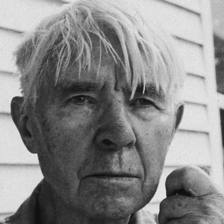
There are too many chapters which list events that do nothing to develop Lincoln, the man, or Lincoln the President.
After the early years the book is about Lincoln the president. No much about the man, relationship to wife or children. Was he religious, I cannot tell? Nothing about attending church and only show him once or twice consulting the Bible, but instead relying on his folksy stories, though the moral of many of these stories could have illustrated from the Bible.
It has no sources or bibliography. Opening preface eschews footnotes.
Barbara Tuchman, The Guns of August (1963)
Highly recommended.
The second Tuchman book I have read. This by legend is the one Jack Kennedy read and it scared him when he thought about nuclear weapons.
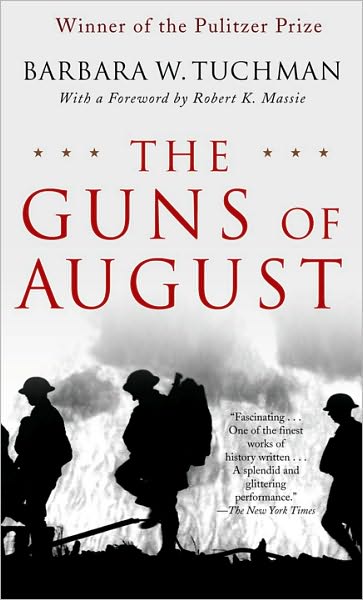
One of Tuchman’s major themes is that a plan carefully made in detail and extensively supported takes on a life’s of its own. If a small shove engages the plan, then it takes a super-human effort to divert it, stop it. (When President Kennedy abruptly gets up from the table and walks out of the room while the Air Force generals are arguing for bombing Cuba in the film ‘Thirteen Days’ that is one example of the effort to resist a plan in the face of enormous pressure.) In 1914 the Germans had the most extensive and detailed plan for war of all time and so were the most bound by it. It specified the train cars platoons would ride it and at what place and time they would, dismount from Mobilization Day (or M40) plus 40 in Paris. Once the plan was initiated everyone knew what to do and set about doing it. Belgian resistance which had been set at 0 in the plan broke down the schedule and traffic jams resulted. The perfect plan contained an erroneous assumption. But that dislocation simply made it more imperative to get back on schedule, not to think twice about the plan. The General Staff set to work around the clock to re-route trains, to re-supply units, to to find alternative roads, to shift rolling stock, and so on.
Another general theme is the difficulty of getting anyone to obey orders. French, German, Russian, and English generals refused orders, stalled, deliberately misunderstood, or willfully rendered themselves incommunicado. Even when the superior officer came and delivered the order face-to-face in person the response was sometimes tomorrow, not just yet, or no. At times it was impossible to replace this general so he stayed in command and did not move. The Prussian General Francois waited and stalled and stalled until he was ready to move on his terms. The Prussian Von Kluck ignored his order and improvised in the hope of a magnificent coup and blundered.
In the same vein, she stresses the general confusion of war. The German Chief of Staff had little idea of what the situation with his own armies was, let alone where the French or English were and in what force. Ditto for corps and division commanders.
Another theme is the logistic of moving regiments, divisions, corps, and armies. The staff work was crucial. To move 70,000 armed men with artillery and other equipment takes a very great deal of detail and direction, a timetable for movement, an allocation of roads or railroad cars, fodder and food along the way, and much more. It all makes Sydney’s Town Hall Station at peak hour seem organized.
The tangled web of secret treaties, each with its conditions and conditionals, made it difficult for anyone to predict what would happen. And even where there was a simple and clear treaty inevitably it was made by someone else a few years ago and the question of the will of the current incumbents to live up to it arose.
The disobedience gave scope for individuals to make a difference. Her study by the way is all at the command level, generals and up, not grunts.
Of personalities, the Kaisar seems a loose cannon who wanted to show the world Germany was a great power. The French general Joffre made many mistakes, none of which he ever admitted, but was a rock of calm and optimism. French, the English commander, lost his nerve not even a personal visit from Kitchner could stiffen him.
The contradictory character of orders plays into the disobedience. A general is ordered to attack but cautioned not to expose his flank. A general is ordered to be aggressive but not to risk defeat. Which part takes priority, aggression or risk avoidance?
Galiani seems to have been the man for the hour at the Marne. His idea of a long meeting was 15 minutes, all else was action. He was a general without an army for the most of the time but that only slowed him down, it did not stop him. The taxi cabs were but one of his initiatives.
King Albert of Belgium was ready to fight from the first and did not relent when the Germans started shooting civilian hostages. Even a German effort to buy him off for an enormous sum was rejected.
The Russians fulfilled their French alliance by attacking long before they were ready and that led to be a major defeat from which they never recovered, but it did draw off two German army corps from the invasion of Frances and that helped weaken the German advance in the West. There are many ifs and might have beens.
Even the most bellicose commanders, when the order to attack came, hesitated, trimmed, temporized.
She has many masterful turns of the phrase. Impressive research and synthesis from original sources. The scope is everything that happened in August 1914, well literally from the July assassination to the started of the Battle of the Marne in mid-September.
The tactical of manuals of the Russian army placed little emphasis on shells for either rifles or cannons, but instead stressed sabres and bayonets. The German manual told attackers to run 20 seconds then fall down while the enemy fired every 20 seconds. After they have fired get up and run again. But the fire rate was 8 seconds as it turned out.
Though most of the weapons, artillery and machine guns, that dominated World War I were used by the Japanese against the Russia in Asia, and dutifully reported by the European military attachés who observed the Russo-Japanese War, virtually nothing of that made its way into the manuals, the ministers of war, or generals.
Personal rivalries and antagonisms between generals often spoiled plans.
The capacity of politicians to dither in the hope that the crisis would dissipate of its own accord in England and France is worth reading. Even with the Germans 40 miles from Paris no democratically elected office holder would permit General Galini to demolish building to create firing lines. Instead they argued over who would pay compensation to the owners and questioned the necessity of destroying bridges to impede the German advance. Galini wanted to mine all the bridges over the Seine and delegations of historians opposed him. There was very little singular focus even with the Barbarians at the gates.
Speaking of barbarism, the German atrocities in Belgium did occur and they were systematic.
The Zimmerman Telegram
Barbara Tuchman, The Zimmerman Telegram (1958). Recommended.
It is far fetched and yet true story of how the Kaiser’s Germany tried off-and-on to encourage animosity between Japan and the USA, between Mexico and the USA and then an alliance between Japan and Mexico against the USA, or between the Japan, Mexico, and Germany against the USA to keep the USA out of European affairs, especially in the years for American neutrality in WWI. The various schemes were launched independently by several German agents and government departments promoted a Japan-Mexico alliance funded in part by Germany to keep the USA locked into North America. It included either a Japanese invasion or inflitration through Baja California. The prize offered to the Japanese would be the Philippines and Hawaii and to Mexico the return of Texas, New Mexico, and Arizona. If Mexico could be won over it might stop the flow of Tampico oil for USA navy and might offer naval basis to U-boats along with the oil.
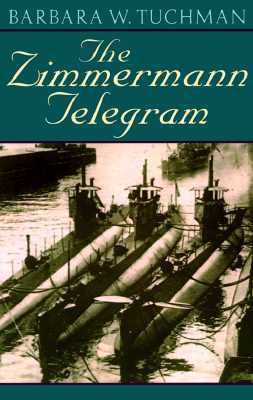
In World War I Japan had allied itself with the England and France, but once it had occupied the German possessions — Guam, Samoa, and the Marshall Islands — in the Pacific it had no further interest in the war. Germany was willing to give those up for Japan to dabble in Mexico. There was even at one time mention briefly of a formal military alliance of Germany, Japan, and Mexico.
The Japanese encouraged the approaches to see what was on offer, but never seemed to be seriously considering it. But simply being receptive was disturbing intelligence in Washington. The real value of Japan to the Western European alliance was that it secured Russia’s Asian border so it could concentrate its armies in Poland and not have to hold back some to guard against a Japanese attack and replay of the Russo-Japanese War of 1904. Accordingly, to the Western Allies the goal was to neutralize Japan one way or another. Anything that jeopardized that neutrality was dangerous. Hence the German efforts to do just that.
At the time Mexico was a cauldron of vying war lords throughout this period: Villa, Huerta, Carranza, and others. Each willing to promise anything to get arms and gold, each hating El Norte. (Well that just about sums up a great of Mexican history to today.)
President Woodrow Wilson is presented as an inflexible idealist who could not shape his manner, means, or message to the circumstances. He worked from elevated first principles for all times and all places, and so not suitable for any particular time or place. His invasion(s) of Mexico was for its own good! He found it very frustrating that Mexicans did not realize that and acquiesce. His goal was regime change! History is repetitive. He was quite upset that Mexicans resisted and united against his invasions.
Colonel House features largely in this story as one who enjoyed playing the game that he often lost sight of what it as all for. Because he enjoyed wire pulling so much, he overestimated his own influence.
Wilson ignored the reports and advice of diplomats because he knew they did not imbibe his goals of world peace and were concerned only with American interests, including business interest in Mexico and with Germany. Instead he relied on House who never said anything Wilson might not want to hear.
Robert Lansing came early to the conclusion that war with Germany was inevitable. He was reading the diplomatic reports and realized Germany would never compromise to make peace.
The most astounding thing was that Colonel House convinced Wilson to let the German embassy in Washington DC use State Department cables, during US neutrality, to communicate with Berlin and for the German foreign office to reply by the same means ostensibly to consider peace terms but in fact it was to avoid British intelligence surveillance in communicating to Mexico from Washington DC. The Secretary of State, Lansing, to his credit resisted and demanded a written order from Wilson each of the many times over weeks, because it violated neutrality.
Even after the Zimmerman Telegram was revealed the Germans kept using it this American channel. It seems never to have occurred to any German that the code had been broken somewhere. They tried to trace the leak and the English tried to conceal it. Zimmerman, by the way, was the German foreign minister.
The Zimmerman Telegram was timed to coincide with the launch unrestricted submarine warfare with the up of an uprising in Mexico and the prospect of a Japanese attack on The Philippines, or Hawaii, or even California to paralyze the USA. The German General staff estimated Britain could only hold out six months with unrestricted submarine attacked. If the USA was pinned down for a time, it might be long enough to compel a British surrender. Without Britain, France would, the Germans supposed, fall over.
The declaration of unrestricted submarine warfare depended on having 200 U-boats operational to go to unrestricted warfare to cover the sea approaches to Britain. When that number was reached, the declaration was made.
The British had broken the code and since the German sent that Telegram three times, such was their confidence in the impenetrability of the code, once via the neutral Swedish diplomatic route which the Swedes offered to Germany throughout the war in violation of their own neutrality, via radio from Berlin, and by Telegram to Washington D.C., they got it. The British wanted to conceal the fact that they had cracked the code so that the German would keep using it. So they had to figure out a way to reveal the message to the USA in such a way to prove its authenticity but not so much as to reveal how the USA came to have it. That is a convoluted story best read.
Yet there is more. The authenticity was denied by American pacifists like Robert LaFollette. The Senate was set to block. Then Zimmerman in Berlin called a press conference. The opening question came from a pro-German American journalist who said ‘Of course,you are going to deny it….’ But no, Zimmerman said, ‘I can’t deny it because it is true.‘ End game! Then he proceeded to split hairs about whether the putative alliance was to apply before or after the USA entered the war. Too late, the admission undercut the deniers in the USA.
Let’s count the blunders there. Zimmerman did not need to have a press conference. If there was one, he could have sent someone else. If he went, he could have stalled, temporized, or prevaricated since time was the essence. Remarkably he continued in office.
When the telegram was revealed, the fact that it had been transmitted unknowingly by the State Department was omitted.
Tuchman argues that the German were determined to win the war because to settle or lose would mean a revolt that would lead to a regime change and Kaiser would be gone. They were right…
The book has many marvelous turns of the phrase, and enough skulduggery for several Le Carré novels. Spies and counter spies tripping over each other.
A few quibbles. A lot of guesses are passed off as fact, e.g., ‘when he read the telegram, his heartbeat faster..’ ‘When the Kaiser again ….., he felt his grasp on reality slipping away.’ How can she possibly know the inner mind of all these characters. Of course, it adds a human touch to offer these comments and makes it read like a novel, but …. it is sheer speculation. She could have said ‘he might have felt his grasping reality’ or ‘his must have beat faster’ but these subjunctive constructions reveal the description as hypothesis not as fact. Just in case she was paraphrasing a source I checked the notes three or four times and found nothing to support the text.
She also more than once reifies a nation, ‘Germany reacted.., rather than which Germans or ‘the State Department was embarrassed when..,’ rather who was embarrassed.
She underestimates William Jennings Bryan and disparages him as though she had recently seen the play ‘Inherit the Wind‘ (1955). He was certainly the most well travelled man in Wilson’s cabinet and he read German and his wife spoke French on their travels. I have no doubt that he would have blunted the pervasive and pernicious influence of Colonel House in the State Department.
She makes no mention of that superstar journalist of the day H L Mencken who was pro-German. Yet he made enough noise for six others.
I was keen to read this as a precursor to her great book The Guns of August (1962), and also because I found that the Zimmerman Telegram was hardly mentioned in the biography of President Wilson I read, yet I recalled it to be of great importance.
Junk Mail – round two in which I declare a truce.
Avid bleaders know that I collected, sorted, described, and analyzed one year’s worth of junk mail in the letter box at the Ack-comedy in Newtown.
The totals were impressive and depressing, the more so when multiplied by the number of postal addresses in Newtown. Several tons of unread material each month.
Now that I knew the world, I set about changing it. (An echo of one of Karl Marx’s more declamatory remarks.)

I had thought to stem the tide of junk mail in my own letterbox and then promote that method to others in the name of the Junk Mail Liberation Movement, of JuM_LiM, as I styled it. Some organization, effort, and persistence would pay off, I thought. Hope makes fools of us all. (Hark, that is Aristotle at a far remove.)
In the action phase, I started to keep a register of every item of junk mail in my letter box, sending it back to its origin with a letter, email, or note asking that no future items be delivered to my box number…. I did not expect it to be easy but I am made of stern stuff, after all I sat through StarTrek Into the Darkness. After that experience, anything seems easy.
I registered the first fifty items I received over a two-month period. A direct approach with a personal request, phrased ever so politely, would get attention, and lead to action. Well, that is what I thought. Hope, it deceives all.
Indeed I had feedback from one of the first I contacted that was contrite and apologetic. Ah ha, thought I, this is the right track. That was a King Street estate agent.
Not to be. Within a week I got another junk drop from that very same estate agent. There are many agents in the office and though one was contrite the others happy trespassed on my letter box to dump their junk.
In another case, since the junk drops were every two weeks, I sent three letters to one local restaurant asking to be excluded from the junk drops. To no avail. They just kept coming.
I sometimes used the Contact Us feature on web sites, or direct email. In other cases I found a postal address, either on the company web site or in the online telephone book, and sent a letter. Some web sites had no address, no email, and no Contact Us, but only a phone number and I drew the line there. No telephone calls. Nor would I go to the local restaurant (ever again) and demand exclusion. The exercise is not about confrontation, but rather to try to find a user-friendly way to diminish the tiresome tide of junk dumped in the letter box.
I also searched the web for ideas. Australia Post, amid denials that it ever delivers junk mail, suggests a No Junk Mail sticker. Tried that. For the Hair Splitters I added a No Unaddressed Advertising Material sticker. I also studied the Australian Catalogue Association web site. Its advice was focussed on addressed catalogues, as was the Australia Post web site. This advice is repeated on many other green web sites, as if it does any good, such is the paucity of creative thinking. Addressed catalogues are not the problem.
There are many web site offering a variety of No Junk Mail stickers but none that evaluate the effect of this stickers. I have it is only slightly greater than 0, but not much. Harvey Norman and Mitre Ten junk mail walkers respect my sign but not any others.
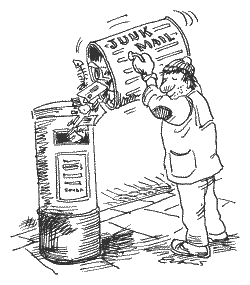
The problem is individual flyers from all manner of small businesses. The problem is not catalogues from major retailers, at least not any more.
But I did notice when I looked further afield that in both Britain and the United States there are more resources to a householder in the resistance to junk mail. The letter box is, after all, private property, and throwing one’s trash into it is a trespass. That conclusion has been reached in some jurisdictions in Great Britain. The United States Postal Service has also been vigorous in preventing interference with the mails, e.g., letter boxes stuffed with junk so that the mail cannot be inserted. All of that is better than nothing, but it does not seem to have much effect in either country.
Indeed I have seen that the cataloguers from major retailers in Australia argue that their catalogues are read by recipients (usually based on survey of shareholders’ households, always inspect the data). Be that as it may, the major retailers in my case do respect the No Junk Mail stickers. It is the local, minor retailers who do not.
In that debate I noticed that the industry association for producing the paper that the junk mail is on, also has lobbied against any legislation that would diminish the amount of junk mail in Australia. Think about that. It’s jobs…first to make the paper and then to dispose of it. Largely unproductive and more than a little destructive work, but work all the same. In the same vein I found a few angry diatribes from individuals who claim to derive a livelihood as a junk mail walker defending their right to dump trash in my letter box, and denouncing any complaint as a threat to their livelihood.
No doubt some hardworking Germans said the same about gas chambers.
What I was looking for was some way to report the offenders, if for no other purpose than social awareness. I found no recourse available in Sydney, in New South Wales, or in Australia.
In the end, a few weeks ago I gave up this round of my war on junk mail and scrapped the register I was keeping in a spreadsheet. This is a truce, not a peace. It is round two with the prospect of a round three reserved.
Glossary
A bleader is a reader of a blog.
The Ack-comedy is my private office in Newtown.
Barbara (2012)
A character study set in the German Democratic Republic (DDR) of 1980. Understated, muted, ambiguous, spare, unadorned, and demanding. Recommended for adults.

Dr. Barbara Wolfe applies for an exit visa to leave the Workers’ Paradise that is the German Democratic Republic. Verboten! She is transferred from the prestigious East Berlin university clinic to an under-equipped small hospital on the Baltic Coast. Her visa request is denied. We piece this together from cryptic remarks and visuals. There is no exposition. One is left to infer the meaning of what one sees. Nor is there music. Instead there are winds in the trees and the distant sea and the creak of floorboards.
Rejection and transfer confirm her desire to leave.
Meanwhile, at the provincial hospital she sees the next generation being ground down by the regime. Dr Wolfe befriends a young girl who has repeatedly escaped from a nearby Labor Camp. Quick to apply the regime-approved label, the physicians suppose she is anti-social, seeking only to avoid work. Dr Wolfe finds that she has meningitis and sets about treating her. She also observes the consequences of a young boy’s attempted suicide. His attempt was born from a love affair but it becomes a crime against the state and when he recovers he, too, will go to another labor camp. Wolfe says these ‘Arbeitlagers’ are in fact ‘Sozialistische exterminaiton Lagern.’ I am sure readers can work that out.
Everything is the business of the STATE in this world.
Throughout Dr Wolfe is harassed by the police, and I mean harassed! Throughout she distrusts her new colleagues and they reciprocate. It is a society where everyone reports on everyone else, perhaps like North Korea today.
The paramount importance of the East German state justified its totalitarianism but totalitarians will always find a paramount cause to justify telling everyone else how to live be they self-righteous Greens or God-bothering Christians. One totalitarian is pretty much like another.
In time Barbara Wolfe comes to terms with her Sisyphean existence and concentrates on her work.
There is a remarkable scene when the Stasi officer comforts his wife that shows a humanity I have never before seen credited to agents of the DDR on screen since 1989. I thought that more striking than the self-abnegation at the end, surprising as that was. Wikipedia has it that as many as 4,000 East Germans died in the Baltic Sea trying to get to Denmark.
To find out more about life in the DDR I recommend Timothy Garton Ash, The File: A Personal History (Random House, 1997). Many who have commented on this film on the Internet Movie Data Base know nothing of the DDR, it would seem.
In 1980 pin-headed intellectuals in the West routinely denounced the evils of liberal-democracy, while enjoying its fruits, and defended regimes even worse than the DDR. I have yet to hear a mea culpa from these sycophants.
By the way, the past is still with us. The Wikipedia entries on the DDR are contested. Its apologists insert and insist on its merits, denying the facts of their own lives at times, it seems, such is the power of a dream, albeit totalitarian. Perhaps the most profound judgement on the DDR lies in this fact: from 1947 to 1989 its population shrank from 19 million to 16 million. As the young girl says, in effect, in Barbara this is no place to be born.
A small quibble: Nina Hoss’s eye shadow, if I have the term right, was distracting and out of place. I cannot imagine the exiled women in the DDR has the means, the time, the motivation to apply blue eye shadow to get that Cleopatra look.
Les Saveurs du Palais
Times are tough in her one-woman restaurant and when the offer comes to cook for a senior official in Paris for a couple of years at an incredible salary, Hortense takes the bait. I particularly liked the stunned silence when she is told that Joël Robuchon recommended her. (It is like being recommended by Zeus, a higher being.) Soon enough she realizes she is cooking for the President of France (loosely based on François Mitterand) in the Élysée Palace at 55 rue de Saint Honoré.
Recommended for adults.
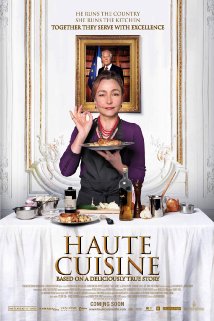
There are some insights into the workings of the Building and its many thousands of employees, with some amusing, perhaps alarming scenes for taxpayers, examples of the waste caused by a ten minute delay in a departure for the airport. There is the inevitable tension between different departments within the household.

Hortense’s mission is to cook for the President in a simple way to give him a contrast to the formal, state dinners with their elaborate sauces, etc. Yet she has no way of knowing what the President likes, since she has no access to him, so she examines his plate when it is brought back from the table and infers from that.
The men in the main kitchen, they are all men, resent the existence of this small private kitchen in the residential wing do all they can to undermine it. All too believable. They would do this in any case but that the private cook is an unknown women triples their efforts.
She struggles, not always with success, to limit cost, achieve the highest quality, and stay within the dietary regime of the dying President. Meanwhile, the boys in the main kitchen carp, grudge, cheat, backbite, undermine…
It is great fun, plenty of food to drool over, and I also liked her brief excursion to the Antarctica research station to cook for the crew. There she talked to the diners, learned what they liked, enlisted their help in securing items, and enjoyed it a lot more than than the starched, constrained, combative, zero-tolerance, macho environment at Numero 55. Yes, strange though it may seem the Palace was presented as much more macho than the research station on the edge of the world, which by contrast seemed much more like a family, a large and noisy one to be sure.
While the ‘Tastes of the Palace’ makes perfectly good sense, for reasons unknown the distributor of this film have called it ‘Haute Cuisine’ in English. It is a title at odds with the major theme about food, namely that simple food is best when made from the best available produce. No doubt an advertising agency thought Haute Cuisine would appeal to some regardless of the intellectual coherence of the film.
If Woodrow Wilson had lost the 1916 election
Hypotheticals are often very entertaining, and sometimes, though rarely, informative.
Woodrow Wilson concluded in October 1916 that he would lose his bid for re-election in November against Charles Evans Hughes, the Republican nominee. As a constitutional specialist Wilson had always deplored the hiatus between the early November election and the inauguration of the new president in March of the following year. During that three month period — the lame duck period — the incumbent had no legitimate authority though the formal powers remain.
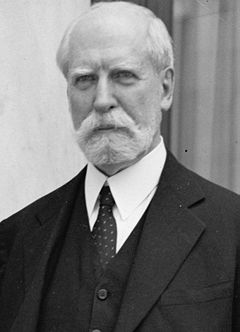
Charles Evans Hughes
In 1916 the lame duck would be no laughing matter with submarine warfare a weekly occurrence off the Atlantic coast of the United States and Europe burning in an endless war on a gigantic scale while Japan sharpened swords in the Far East and eyed Mexico. In that situation Wilson had no wish to exercise the formal powers shorn of a popular mandate. Moreover, he thought the people’s choice should take on the responsibility immediately.
He made a secret plan to accomplish that end while staying within the Constitution. Here is how he proposed to do it. As soon as it was official that Hughes had won, he would dismiss the Secretary of State, Robert Lansing. Wilson would then appoint Hughes to be Secretary of State. While Congress is not sitting the President can make acting cabinet appointments like this as a temporary expedient until Congress reconvenes. Once Hughes accepted the appointment, Wilson would ask his obliging and unambitious Vice-President Thomas Marshall to resign. Without a doubt Marshall would have readily complied. (Lansing would have almost certainly resisted but he served at Wilson’s pleasure and at the end of the day would have had no choice but to stand aside, willing or unwilling.)
With the way then clear, Wilson would himself resign, and by the existing line of presidential succession the baton would pass, absent a Vice-President, to the Secretary of State, Charles Evans Hughes who would also be President-Elect. Wilson’s supposed that this could be done within three days or even less once the election results were known. Hughes had only to travel from New York to Washington and say ‘Yes.’ Of course, Wilson hoped against hope to win, so he put the plan which he had typed himself in a desk drawer and waited.
On election day the result was close, and in 1916 reporting results was slow and sometimes uncertain since journalists sometimes jumped the gun. (No comment.)
It seemed by late evening on the East coast that Hughes had won. Hughes went to bed believing he had been elected President of the United States. But he woke up to find that California had voted for Wilson and the left coast was enough to keep Wilson in office. The secret plan went into the locked filing cabinet of history. Would a president today think so hard about the best interests of the country and be prepared to concede to an opponent to serve that interest?
In 1933 the XXth Amendment to the United States Constitution reduced the gap between the election and inauguration from early November to January and re-routed the Presidential succession, after the Vice-President, through the presiding officers of the House of Representatives and the Senate before going to the Secretary of State.
There are two competing principals. The first is that a successor should be someone aligned with the president and au fait with current developments in the executive, hence the Secretary of State as the most important cabinet office should be third in line. That principal applied until 1933, despite Secretary of State Alexander Haig’s remark when President Reagan was shot in 1981.
The second principal is that the successor should be an elected official with broad responsibilities, hence the presiding officers of the legislatures. While not members of the executive, they are engaged with the daily processes of government.
Eight of 44 presidents have died in office. In each case the successor was the VIce-President.
By the way, Hughes had a long and varied career in public service: Governor of New York, Associate Justice of the US Supreme Court, Secretary of State, Justice on the International Court of Justice, and Chief Justice of the US Supreme Court.
Ben Oxlade, Death in Brunswick
Recommended for the Melbournoisie out there. But they have all probably read it. Not a krimie, worse luck.
A two-hour diversion into the drug addled mind of ole whashisname, Cookie, Carl the cook, or is that Charles. Sometimes not even he is sure.
Cruel but insightful and amusing caricatures of the feminist wife, the Irish mother, the Greek club owner…..and Carl himself.
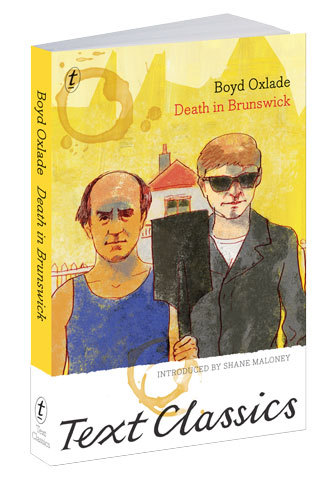
His movie review fits most of the trash on the wide screen today: deafening, gory, brain deadening, blinding… Get the result same from a finger in a power outlet!
‘They went into the theatre. it was a maelstrom of noise. The film had started….. The screen was awash with meaningless images and the soundtrack was a … frightening roar…. Creatures from his worst alcoholic nightmare, groped and slithered across the screen.’ That’s entertainment! That describes ‘Star Trek: Into the Darkness’ very well.
Quite fitting that Shane Mahoney wrote the intro. They have the same ink in their veins. Though Mahoney’s effort to compare this book to Thomas Mann’s ‘Death in Venice’ falls flat.
A google search does not return any other novels from Oxlade. A one book writer and even that book is now overshadowed by the movie in the publisher’s blurb on the back of the book has more enthusiasm for the film than the book.
